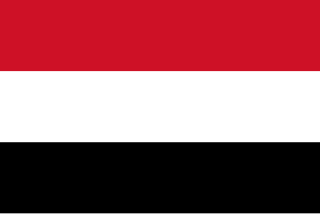
The International Atomic Energy Agency (IAEA) is an international organization that seeks to promote the peaceful use of nuclear energy, and to inhibit its use for any military purpose, including nuclear weapons. The IAEA was established as an autonomous organisation on 29 July 1957. Though established independently of the United Nations through its own international treaty, the IAEA Statute, the IAEA reports to both the United Nations General Assembly and Security Council.
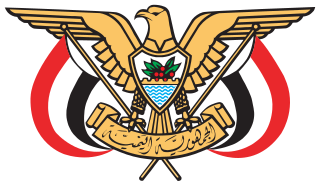
The foreign relations of Yemen are the relationships and policies that Yemen maintains with other countries. It is a member of the United Nations, the Arab League, and the Organisation of Islamic Cooperation. Yemen participates in the nonaligned movement. The Republic of Yemen accepted responsibility for all treaties and debts of its predecessors, the YAR and the PDRY. Additionally, Yemen has acceded to the Nuclear Non-Proliferation Treaty and has stressed the need to render the Middle East region free of nuclear and other weapons of mass destruction.

The United States Department of Energy (DOE) is a cabinet-level department of the United States Government concerned with the United States' policies regarding energy and safety in handling nuclear material. Its responsibilities include the nation's nuclear weapons program, nuclear reactor production for the United States Navy, energy conservation, energy-related research, radioactive waste disposal, and domestic energy production. It also directs research in genomics; the Human Genome Project originated in a DOE initiative. DOE sponsors more research in the physical sciences than any other U.S. federal agency, the majority of which is conducted through its system of National Laboratories. The agency is administered by the United States Secretary of Energy, and its headquarters are located in Southwest Washington, D.C., on Independence Avenue in the James V. Forrestal Building, named for James Forrestal, as well as in Germantown, Maryland.

The Office of Scientific and Technical Information (OSTI) is a component of the Office of Science within the U.S. Department of Energy (DOE). The Energy Policy Act PL 109-58, Section 982, called out the responsibility of OSTI: "The Secretary, through the Office of Scientific and Technical Information, shall maintain with the Department publicly available collections of scientific and technical information resulting from research, development, demonstration, and commercial applications activities supported by the Department."
The Pakistan Nuclear Regulatory Authorityپاکستان نیوکلیئر ریگولیٹری اتھارٹى; Acronym: PNRA), is mandated by Government of Pakistan to regulate use of nuclear energy, radioactive sources and use of ionizing radiations. The mission of PNRA is to protect the public, radiation workers and environment from harmful effects of ionizing radiations by formulating and implementing effective regulations and building a relationship of trust with the licensees and maintain transparency in its actions and decisions.
The Multan Heavy Water Production Facility is a small heavy water production plant, located in Multan, Punjab, Pakistan, with an original annual capacity of 13 metric tons. Equipment for the plant was partly obtained from Belgium in 1980.
Section 123 of the United States Atomic Energy Act of 1954, titled "Cooperation With Other Nations", establishes an agreement for cooperation as a prerequisite for nuclear deals between the US and any other nation. Such an agreement is called a 123 Agreement. To date, the U.S. has entered into roughly twenty-three 123 Agreements with 48 countries. Countries with which the U.S. has or had or is working towards having a 123 Agreement include:
Programme of Action for Cancer Therapy (PACT) is a programme created by the International Atomic Energy Agency (IAEA) in 2004 to build upon the Agency’s experience in radiation medicine and technology, and enable developing countries to introduce, expand or improve their cancer care capacity and services in a sustainable manner by integrating radiotherapy into a comprehensive cancer control programme that maximizes its therapeutic effectiveness and impact. Such a programme integrates and aligns cancer prevention, surveillance, screening and early detection, treatment and palliative care activities and investments, and is set up based on the Guidelines of the World Health Organization (WHO). It also addresses other challenges such as infrastructure gaps and, through partnerships, builds capacity and long term support for continuous education and training of cancer care professionals, as well as for community-based civil society action to combat cancer.

United Arab Emirates–United States relations are bilateral relations between the United Arab Emirates and the United States of America. The United Arab Emirates has been described as the United State's best counter-terrorism ally in the Gulf by Richard A. Clarke, the US national security advisor and counter-terrorism expert. In terms of defense, the United Arab Emirates Armed Forces has been nicknamed "Little Sparta" by United States Armed Forces Generals and US secretary of defense James Mattis for its active role against extremists in the Middle East. The United Arab Emirates also hosts the only United States border preclearance in the Middle East.
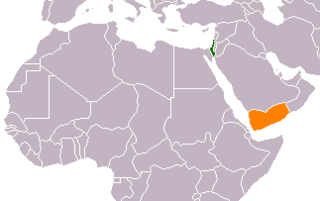
Israel–Yemen relations do not have diplomatic relations and relations between the two countries are very tense. People with an Israeli passport or any passport with an Israeli stamp cannot enter Yemen, and Yemen is defined as an "enemy state" by Israeli law.

Djibouti–Yemen relations are bilateral relations between Djibouti and Yemen. Diplomatic ties between the two fellow Arab League members are strong, and cooperation takes place on many levels. The Bridge of the Horns, a project linking both territories, has also been tabled.
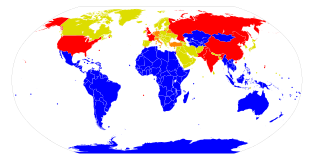
The Middle East nuclear weapon free zone (MENWFZ) is a proposed agreement similar to other nuclear-weapon-free zones. Steps towards the establishment of such a zone began in the 1960s led to a joint declaration by Egypt and Iran in 1974 which resulted in a General Assembly resolution. Following the 1995 NPT Review Conference, the International Atomic Energy Agency (IAEA) held a series of meetings involving experts and academics to consider ways to advance this process.
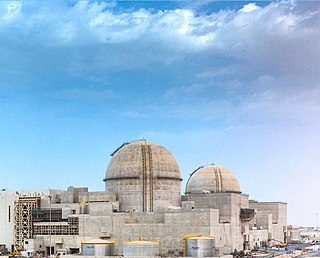
The Barakah nuclear power plant is the United Arab Emirates's first nuclear power station, the first nuclear power station in the Arabian Peninsula, and the first commerical nuclear power station in the Arab World. It is still under construction, and four APR-1400 nuclear reactors are planned to start operation successively between 2018 and 2020, at which point the plant will produce 5,600MW of power. The site is on emirate of Abu Dhabi Al Gharbiya region in the coastline between the sea and the E11 highway, about 50 km west of Ruwais.
Ministry for Atomic Energy of the Russian Federation and Federal Agency on Atomic Energy, were a Russian federal executive body in 1992-2008.
Science and Technology is Jordan's fastest-growing economic sector. This growth is occurring across multiple industries, including information and communications technology (ICTs), solar and wind energy and nuclear technology.
Mohamed al-Atifi is the Defense minister of Yemen from 28 November 2016.

Saudi Arabia has not officially maintained and possessed weapons of mass destruction (WMD). In truth, Saudi Arabia has signed and approved the convention on the prohibition of the development, production and stockpiling of biological (bacteriological) and toxin weapons in 1972. Nevertheless, Saudi Arabia has planned for nuclear foundations and according to some observations, its plans can be led in nuclear weapons. According to some reports, Riyadh has an alleged deal with Pakistan regarding nuclear weapons projects. There are claims that Saudi Arabia has used chemical and biological weapons in Yemen.
